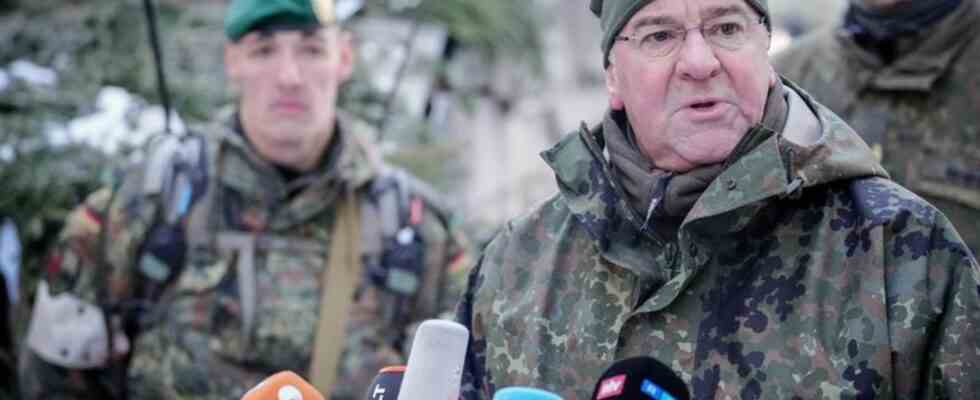Secretary of Defense
Pistorius: Protection of the Baltic partners “without ifs and buts”
Today, “Poland, the Baltic States and other countries are the eastern flank,” said Defense Minister Pistorius during a visit to the Pabrade military training area in Lithuania. photo
© Kay Nietfeld/dpa
It is the new Secretary of Defense’s first mission. In Lithuania, Boris Pistorius meets a grateful but also demanding NATO ally. He wants a permanent presence in his own country.
Defense Minister Boris Pistorius has promised NATO ally Lithuania military protection “without ifs or buts”. During his first visit to the country, the SPD politician also expressed skepticism about the prospect of permanently stationing a German combat brigade – around 5,000 men and women – as is being demanded from Lithuania.
“The idea is that individual units, possibly even the entire brigade, are repeatedly transferred to Lithuania to practice here. That’s the plan,” said Pistorius.
At a meeting with Pistorius in Vilnius, Lithuanian Defense Minister Arvydas Anusauskas reiterated his desire for Germany to station a combat troop brigade permanently in his country. He sees Russia ready for a long confrontation. “Lithuania is striving for a permanent presence of the German brigade in Lithuania because the NATO defense line starts here,” he said. His country is already implementing a plan for building infrastructure that he presented to Pistorius. The NATO summit meeting is scheduled for July in Vilnius.
Bundeswehr strengthens NATO’s eastern flank
Early in the morning, Pistorius visited around 600 German soldiers at the Pabrade military training area, who were practicing the fight against a possible aggressor together with the Lithuanians in a snow-covered forest area. He thanked them for their service, which was a contribution to deterrence. After the Russian annexation of the Ukrainian peninsula of Crimea in 2014, suspicion of Russia grew among NATO’s eastern partners. In response to Russia’s war of aggression in Ukraine a year ago, NATO continued to increase its presence along its eastern flank.
Since the autumn of last year, Germany has had Panzergrenadierbrigade 41 “Vorpommern” ready to defend Lithuania. It is present there with an advanced brigade command post and is supposed to keep weapons and material available in the country. In the event of tension, an immediate relocation of the remaining soldiers should be possible.
An “absolutely valuable resource”
Germans and Lithuanians have been training for days with the “Griffin Lightning” exercise in reinforcement and combat procedures. The exercise was an “absolutely valuable resource,” said Lieutenant Colonel Alexander Döge, whose soldiers practiced breaking into enemy positions and defending themselves on Tuesday. The soldiers had been out and about in sub-zero temperatures for several days. “We marched from our home base in Torgelow over a distance of 1,200 kilometers in five days,” he said. Another soldier pointed out that this type of national and alliance defense is closer to the basic skills of the Bundeswehr than missions abroad.
“Until 1990, the Federal Republic of Germany was the eastern flank. Our security was guaranteed by NATO and its allies,” said Pistorius. And today “Poland, the Baltic States and other countries are the eastern flank”. Germany is here with “very strong forces”. “None of the other nations has more than we do here, as far as I can see and, above all, so consistently,” said Pistorius on NATO’s commitment in the Baltic States. There are currently about 1,450 German soldiers in Lithuania.
The question of a permanent presence of the combat brigade is causing domestic political discussions in Lithuania. The government in Vilnius assumes that a complete brigade with changing personnel will be stationed in Lithuania. The federal government, on the other hand, has repeatedly stated that it has a combat-ready brigade for Lithuania, stationed partly in the Baltic state and partly in Germany. In the event of a tension, it should be able to be completely relocated within ten days.
Most recently, the Lithuanian President Gitanas Nauseda and Foreign Minister Gabrielius Landsbergis, who insisted on a further formalization of the agreement, which the head of state brusquely rejected, have been particularly aggressive. In an interview in early March, Landsbergis figuratively compared the situation with the brigade to “catching an eel in the water with your bare hands”. Lithuania must create the infrastructure for the German brigade, although there is no definitive answer as to whether and when it will arrive in Lithuania.

